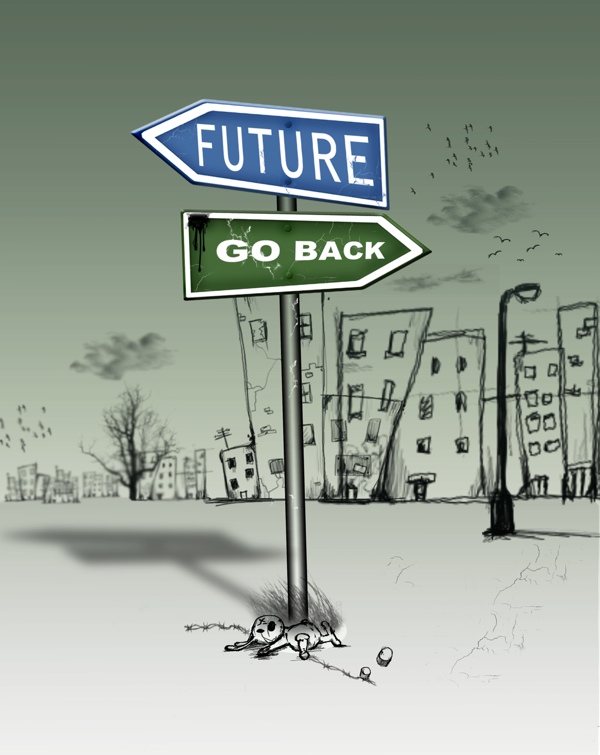 How do you make a decision? Whether it’s buying a new pair of shoes, going to law or plunging into a new life in a different country and culture, it’s a complicated question.
How do you make a decision? Whether it’s buying a new pair of shoes, going to law or plunging into a new life in a different country and culture, it’s a complicated question.
First of all, there’s an instinctive reaction to the decision: you see, you want, you say yes. Then your brain kicks in: do I have the money, will I have the time, will this change my life, will I look better, will I enjoy it, do I want all that upheaval?
Basically, it boils down to the hassle of pushing yourself to change from where you are versus the pleasure you will gain or threat you’ll avoid once you’ve made the decision.
Most people love the status quo – it’s familiar, the pluses and minuses are there to be seen (And I’m not talking about the rock band!). The original Latin in statu quo res erant ante bellum (in the state in which things were before the war), meant all troops were withdrawn and boundaries back where they were before the war. These days status quo generally means the ways things are set up at the moment. Status quo can also refer to a situation that nobody likes but the result of changing it seems too risky.
Here you have two choices: wait and see, or take a risk to change it.
Human beings tend to be irrationally loss averse. In other words, we sometimes prefer to avoid the risk of loss even at the cost of a better than fair prospect. This isn’t us being wimpish; our propensity to protect what is already in hand is hard-wired into our brains. For most of human evolution, our biological ancestors lived in an environment where resources were scarce. If you wanted to feed your family, you had to hunt or gather. If there were natural impediments such as extreme weather, or unfriendly wildlife like sabre-tooth tigers, you might not survive. Over countless generations, this developed a biological basis to loss aversion.
So, taking a decision means overcoming an instinctive dislike of risk. For most people it’s “Shall I buy those shoes?”, “Can I get into that parking space?”, “Which type of pasta shall we have for supper?”. For your hero or heroine, it’s “Shall I turn my back on this?”, “Shall I put myself in danger?”, “Can I trust him/her?”, “Why would I leave my safe but boring life and risk an uncertain but wealthy life with strangers?”.
Writers have the power of pushing characters to that decision point by introducing a crushing threat. Readers love seeing characters struggling with these decisions, it makes delicious tension. But writers must chart how their characters deal with conflict and come to make decisions or they’ll look unbearably smart and a bit wooden.
Of course, it’s a heroic virtue to be able to make a good decision under pressure, but even the most decisive character has to have a wobble from time to time…
References: Kahneman & Tversky’s Prospect theory (http://en.wikipedia.org/wiki/Prospect_theory) and Pearlman’s Loss aversion, evolution and Risk complacency (http://philpearlman.com/2009/02/03/75319882/)
UPDATED 2022:Alison Morton is the author of Roma Nova thrillers – INCEPTIO, CARINA (novella), PERFIDITAS, SUCCESSIO, AURELIA, NEXUS (novella), INSURRECTIO and RETALIO, and ROMA NOVA EXTRA, a collection of short stories. Audiobooks are available for four of the series.Double Identity, a contemporary conspiracy, starts a new series of thrillers. Double Pursuit, the sequel, is now out!
Find out more about Roma Nova, its origins, stories and heroines and taste world the latest contemporary thriller Double Identity… Download ‘Welcome to Alison Morton’s Thriller Worlds’, a FREE eBook, as a thank you gift when you sign up to Alison’s monthly email newsletter. You’ll also be among the first to know about news and book progress before everybody else, and take part in giveaways.













Very much enjoyed (and totally agreed) with your comments, Alison.
The trouble is, I find it so hard to make my own decisions, it’s almost worse making decisions for my characters as I don’t have a particularly stable base to start from! But it’s fun knowing you might never dream of doing the sort of things you make your characters do, or decide.
Decision-making is a great deal more complex than I thought and it was only after I read Daniel Kahneman’s book “Thinking, Fast and Slow” that brought home to me just how complex it is.